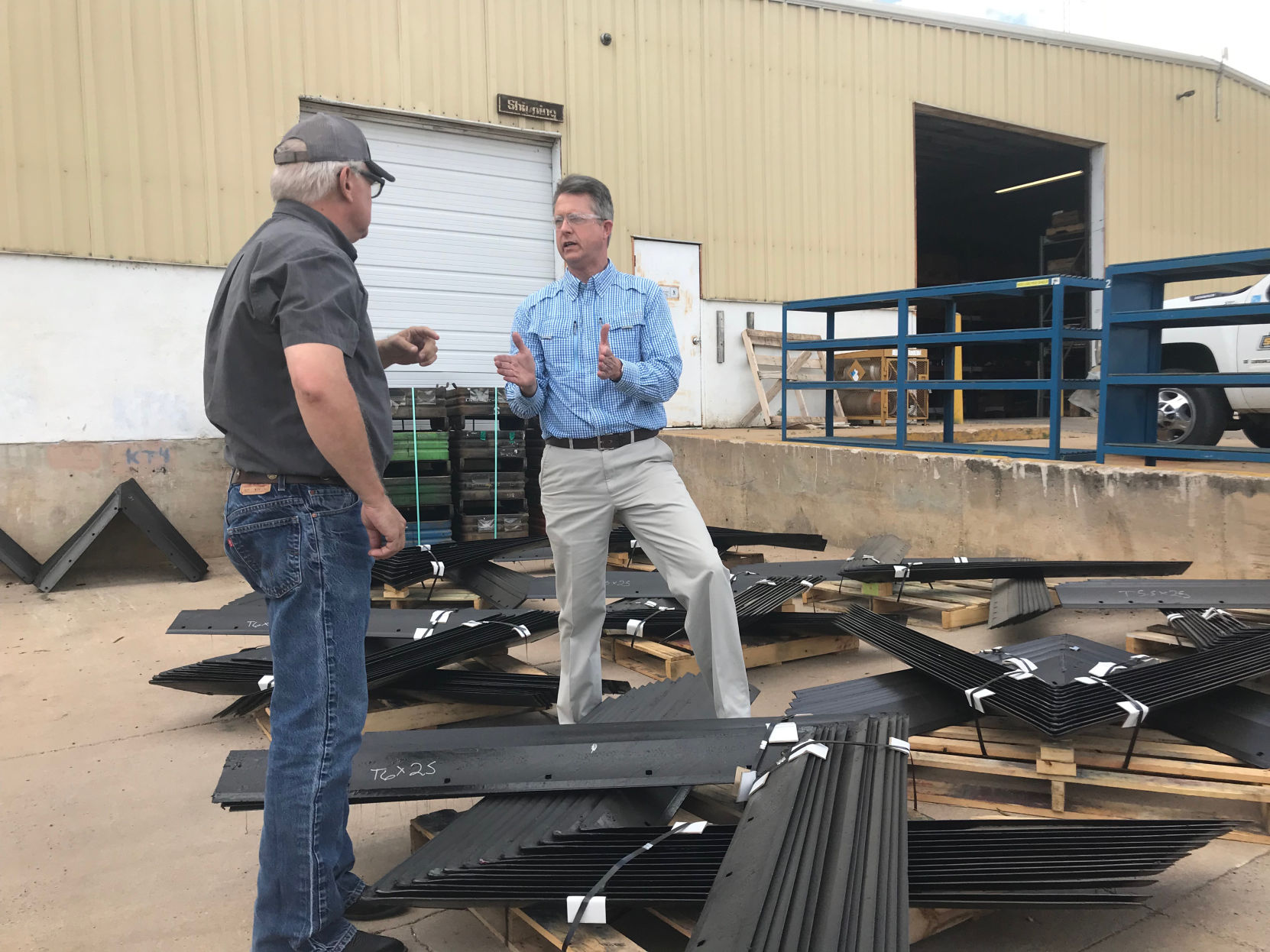From his small manufacturing facility in South Hutchinson, Kansas, Mike Bergmeier has found his agricultural business as one of the unintended consequences of a trade war.
Bergmeier’s 42 employees at Shield Agricultural Equipment design, manufacture and distribute tools and hardware blades for tillage equipment that are distributed across the nation. Among his products are V-blades, used on undercutter sweep plows for conservation tillage, predominantly in High Plains wheat country.
But his annual shipment of the specialty steel to make the blades, slated to arrive at his facility in mid-June, will cost 25 percent more thanks to a tariff President Donald Trump placed on steel from a few other countries, including Canada, where Bergmeier, the company president, gets his product.
Moreover, Bergmeier told Rep. Roger Marshall, R-KS, June 18, the Manitoba, Canada, company is the only place he knows of with a set of roll tools that will make the section of steel very thin so it pulls easily in the field.
“On this single purchase, it is $85,000 more in costs to us, which we will have to pass on,” said Bergmeier, who gave Marshall a tour of his plant before sitting him down to talk trade. “Margins are too slim.”
That equals about 5 cents an acre, which Bergmeier said is a big deal in the current farm economy.
“Times are tough,” he said, adding farmers “are trying to save a nickel an acre where they can.”
He wants an exemption for that specific product. Marshall said he met with U.S. Secretary of Commerce Wilbur Ross in early June and shared Bergmeier’s story. The only problem, Marshall told him, is 18,000 others want one, too.
From the Caterpillar plant in Wamego to pet food plants in Emporia, Marshall said he has heard the fears from Kansas companies on how the tariff on steel could harm their industry.
Tariff talk
The Trump administration announced in late May it would impose a 25 percent tariff on steel and 10 percent on aluminum from the European Union, Canada and Mexico. The countries have promised retaliation, which is a concern for U.S. commodity groups like the National Corn Growers Association, which fears retaliatory action against American agriculture.
About 17 percent of steel is imported from Canada, Marshall said. Another 9 percent is from Mexico.
Marshall said he is lobbying for Trump to give Mexico and Canada an exemption and finalization of the North American Free Trade Agreement.
“We needed NAFTA completed in a very bad, bad way in agriculture. Our No. 1 and No. 2 customers for exports from Kansas and the United States are Canada and Mexico.”
He’s holding Trump accountable, Marshall said, adding, “It’s been a year and a half.”
“This is real people this is impacting. Forty-two jobs here in Hutchinson, America,” Marshall said. “This is an example of a company doing well. So let’s not cut their legs out from under them.”
Marshall said he was meeting with Trump this week and planned to share Bergmeier’s story. Meanwhile, Bergmeier said he received a call from Sen. Pat Roberts, R-KS, who also talked about the Reno County company during Senate hearings June 20.
Bergmeier said he is the largest purchaser of this section of specialty steel in the world. But it is such a small market, no one wants to make it in the United States.
Sign up for HPJ Insights
Our weekly newsletter delivers the latest news straight to your inbox including breaking news, our exclusive columns and much more.
Six companies manufacture implements that use the V-blade, including four in Marshall’s district in Kansas.
Bergmeier added he understood what the president is doing.
“It’s the law of unintended consequences,” he said. “You put a trade tariff on to make those other countries come to the table for fairer trade. And I will freely admit that some of our trade with Canada and Mexico is not fair. They get a cost advantage, they have other advantages.”
“All Trump is looking for is it make that a level playing field,” Bergmeier said. “I totally understand, I agree with what he is doing—trying to get fair and balanced trade. But we have to look at some of these exemptions and go ‘yeah, you’re right.’ That is the only place that is made. We shouldn’t be punishing American industry.”
Amy Bickel can be reached at 620-860-9433 or [email protected].



